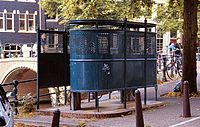
Photo from wikipedia
ABSTRACT This article looks to restore Michel Foucault's concept of the heterotopia to its literary origins, and to thereby resolve the paradox that exists between Foucault's various definitions of the… Click to show full abstract
ABSTRACT This article looks to restore Michel Foucault's concept of the heterotopia to its literary origins, and to thereby resolve the paradox that exists between Foucault's various definitions of the term. Described by Foucault as both an unimaginable space, representable only in language, and as a kind of semi-mythical real site, examples of which include the mirror, the prison, the library, the garden and the brothel, the heterotopia seems inherently contradictory. However, through a reading of an often overlooked radio broadcast given by Foucault as part of a series on literature and utopia, this article demonstrates that the concept was never intended to refer to real urban sites, but rather pertains exclusively to textual representations of these sites. Subsequently, it looks to draw parallels between Foucault's remarks about the heterotopia and several examples of his literary criticism, on writers including Sade, Flaubert and Borges. In particular it draws attention to the similarities between Foucault's definitions of the heterotopia and the language he uses to describe the ‘placeless places’ of Blanchot's fiction, and to posit the heterotopia as an example of Blanchot's notion of literary contestation.
Journal Title: Textual Practice
Year Published: 2017
Link to full text (if available)
Share on Social Media: Sign Up to like & get
recommendations!